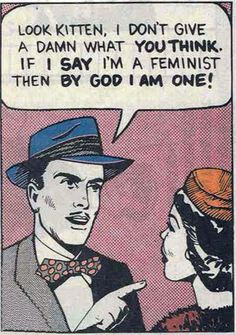What is a woman?
Try taking to one and find out.
Someone who covers her drink when you enter the room

Out of Context Comics is leaking!
I identify with this unironically as a low conscientiousness male feminist.
‘Extra-chromo-sapiens’.
The other ones are ‘whiny-chromo-sapiens’.
‘Arsehole’ is a good cross gender term for any humans of known or unknown sex.
Except “woman” doesn’t mean “female person” anymore, it means “anyone who identifies as a woman” because attaching any common noun at all for people based on sex rather than gender would be accused of transphobia.
It’s kind of like if someone asked what the term for the sexual orientation of someone who is interested in partners they could hypothetically reproduce with is, the answer is there isn’t one and suggesting there should be will get called transphobic.
Just say what you mean. Intersex and trans people exist. For example, “menstruator” or “people who menstruate” if you’re talking about periods. Not all women menstruate, not everyone who menstruates is a woman, and hell, there are plenty of people who have uteruses but don’t menstruate. It’s way clearer and inclusive.
You thought you ate with this comment 😂
partners they could hypothetically reproduce with
“fertile women”
“women capable of pregnancy”
Outdated, slight red flag option: “gynephile”
Or you could even try “I find women attractive and would love to have kids with the woman I love one day”
There, language isn’t that hard.
You’re actually demonstrating my point - I said “a common noun” for one and “a term” for the other. The whole point is that any “acceptable” language for those notions (a person of the sort who possesses female genitals and potentially has ova that she could hypothetically carry to term and identifies as a woman and a person attracted to the sort of person they might hypothetically be able to reproduce with) has to have at the very minimum an adjective if not an entire phrase attached to it.
For example, imagine someone tried to re-popularize the old English words to refer to cis folks, using wifmen for cis women in this example. That would immediately be deemed transphobic, specifically because it’s a common noun to refer specifically to cis women and not a shared category you have to use an adjective or phrase to differentiate from.
Same thing applies to orientation - we have a lot of words for sexual orientations. But a word for a person who is attracted to cis people of a given sex relative to one’s own is unacceptable - the very idea that there could be a term for it is transphobic. Despite sexual attraction being one of those rare cases where what genitals you have and whether or not they’re the original equipment is actually relevant.
Also wouldn’t “gynephile” meaning one who has an attraction to women still not be precise enough, since women includes trans women by definition, at least the feminine ones?
I think you’re just chronically online. Just say female if you’re in a conversation and want to exclude trans women. Most trans people won’t care as long if the context isn’t transphobic. I really don’t see why it’s unacceptable to have an adjective if you’re describing a subset of women. Like there’s not a singular noun for “tall men” but if you’re actually not being transphobic then whatever.
Again with sexual orientation, it sounds like you’re saying that because chronically online. There are people who say it’s transphobic to say straight but exlude trans people. Again, context and intent matters. You can just say straight. This one is tricker because not all trans people have surgically transitioned, genital preference matters, and orientation is a spectrum.
And it’s a tough subject within the trans community itself, because it’s frustrating to present as a gender, transition in every way to that gender, be accepted and pass for that gender, only for someone to say they aren’t attracted to you only after they find out you’re trans. What other conclusion would you have other than transphobia? And it doesn’t help that it often is accompanied by blatant transphobia.
So if someone is calling you transphobic, either the context is also transphobic or they’re misunderstanding your intent.
Do you often find yourself in discussions where the trans-inclusivity/exclusivity of the term is important to know?
Because whenever I use “men, guys” or any other such term, whether it includes trans people doesn’t even cross my mind. Like the discussions if we should welcome “guy friends” at our girls’ game and gossip nights, or if I’m being too naive around “men”. Talking about “males” like an alien species would be weird and mildly offensive. (Mildly because the Finnish word “uros” can imply admiration for a man’s masculinity.)
If you wanted a term for potential partners you could possibly reproduce with, none of the “female, woman, male, man” terms by itself would do, because (even personally known) infertility for various reasons exists.
So that hypothetic person is turned off by learning someone is infertile for any reason?
Let’s say yes, since we’re in a hypothetical. Breeding fetish, perhaps? Maybe just someone who’s specifically looking for a long term relationship leading into children?
Is it hypothetical because no one has wanted to reproduce with you for some elusive reason?
Yes but he’s not looking for a woke word for “females”, so “women” doesn’t help.
Im a hoe and I dont have a vagina so it clearly doesn’t even work 😋
Could you see to my garden plx
I hate that society attached hoe to women like equal rights men can be slutty
Broads.
Is this why they always ask how to define “woman”?
If someone asks you to a define a women, chances are they never met one in real life.
Women implies the existence of nimen and tamen
Mmmmm… ramen
Hmm. Wōmen… Men of Wō… I don’t mean to be racist but their triads freak me out.
Ooo help me learn today if you don’t mind… Where does this prefix grouping come from?
Edit: found it, I think: Chinese?
Correct; wo, ni, ta are the singular forms I, you, he/she/it. Adding the -men suffix turns it into the plural we/you/they.
So literally, ‘we’ are ‘women’.
Yeah, what they’re saying doesn’t make much sense logically though.
Men here is 们, the plural marker for people. Wo (我) is I or me, wo+men (我们) we or us, ni (你) is you, ni+men (你们) is you (plural), ta (他/她/它) is he/she/it, and ta+men (+们) is they.
Some other variants exists, and there’s specifics on the usage. I also missed the tone markers on the pinyin because they’re a pain to type.
Anyway I’m not sure what joke or point they were trying to make.
They say fluency happens when you make your first cross language pun, so riffing on a mediocre meme feels like halfway there.
feminine species
As a magical talking lion, I always go with, “Daughter of Eve.”
It’s Lilith actually
I know someone who ain’t gettin’ into Narnia. Not on Aslan’s watch, lady!
Furry Jesus was watching? Ew.
Common but baseless myth
Wow, it’s been a while since I’ve done a Reddit Atheism™, but the same could be said for the garden of Eden.
A talking lion and a flying squid? That’s some Lovecraftian horror combo
Flying Squid is just my mom de plume. I’m really a Jesus metaphor in big cat form.
mom de plume
What would Freud say about this one? It’s not overly sexual but I like it.
Freud would probably say, “autocorrect, huh?”
I’m not going to fix it now.
A reliable source on TV told me you can’t go wrong with

Ladies
That’s a huge word salat just to say “I’m an incel”
salat
Found the Ger(wo)man.
Is female derogatory? I thought it was just a more scientific classification.
It is not. Americans are insane.
Found the incel!
Found a USian.
I thought it was just a more scientific classification.
It’s a classification of sex like biological characteristics, like chromosomes, hormones, and reproductive organs. Are you asking about that?
Gender is a social construct. Just like race. Where you can be a Black person who is British. Or a Filipino American.
Using scientific terminology in colloquial speech is weird and creepy in most contexts. Calling kids “juveniles” and women “females” carries certain connotations, most of them bad.
If you are calling a woman “a female”, and aren’t a cop discussing a victim or a doctor writing a chart, then yes, it’s fucking derogatory.
We’re not Ferengi.
Yep. A lot of incels seemingly are unfamiliar with scientific classification and try to use it in casual statements.
Like, they sound real stupid trying to redirect it to be about science then saying phrases like “boobs and tits”.
I thought it was just a more scientific classification.
Scientifc classification by sex. Referring to others by their biological sex in a social context is weird and creepy. Even if you believe sex and gender are the same thing, it’s still weird to call people by their sex. “Hello, male human. Want to ingest some fried pieces of cow flesh tonight?”
Using female as a noun (rather than as an adjective, such as in the phrase “female firefighter”, or any phrase of the format “female $noun”) is generally overly clinical and dehumanizing. Some people do it out of habit due to their profession-- usually researchers or soldiers-- but they usually say “males and females”, which while still weird isn’t the worst.
The guys who say “men and females” are the ones you need to watch out for.
Ohhhhh Watch out for what ?
Incel bullshit
Sex-obsessed creep
I mean, you are the one that freaks out when someone mentions the word incel, so I’m thinking that applies to you more than me.
It’s not inherently derogatory, but it does hold a connotation if you refer to women as females particularly in contexts where you wouldn’t/don’t refer to men as males.
Yes using scientific terminology can be derogatory. But in this case, acting like the opposite gender is a species on its own, classifying them as animals and slurring all women as hoes gave it away for me.
Sexism is a helluva drug.
If you call people with vaginas women, you now cross the line for trans folks.
No matter how you phrase it, there will always be someone you will offend. In the case of the word “female” this is driven purely by some folks finding ways to use it offensively, despite it being just as neutral as “women”
Don’t assume malicious intent every time someone uses the word “female” - most likely, they have never put any negative connotations to it and possibly never even heard of this word being used in a negative context.
I mean, if you’re talking specifically in context about people with vaginas instead of women then using the gendered term does exclude both women without vaginas and men with them who are probably a relevant group in that context. But seriously how often does that come up for you? How often is the most important part of the woman you’re referring to her anatomy?
And while “females” is probably just as accurate in most contexts it’s also been poisoned with incel vibes at this point and it’s gonna be some time before it can be salvaged for general use outside of specific biological contexts without sounding like you’re about to unload a whole lot of baggage into the thread instead of getting therapy.




















